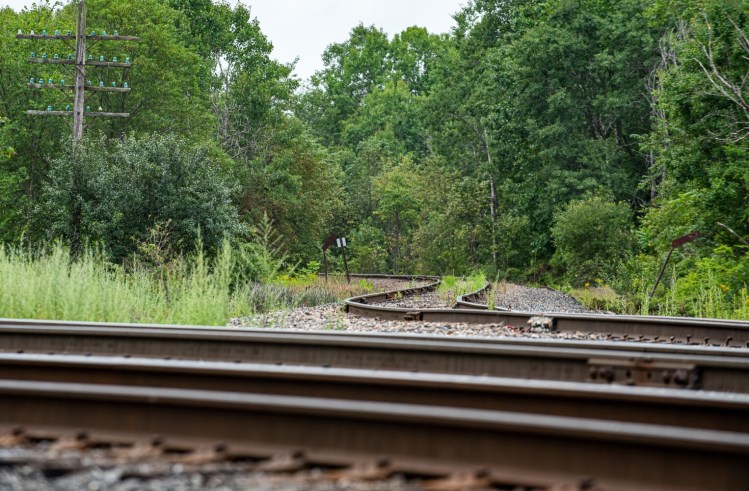
AUBURN — City officials are expected to take up a resolution next week in support of using the inactive St. Lawrence and Atlantic Railroad between Auburn and Portland as part of a proposed 72-mile Casco Bay Trail.
During a council workshop earlier this month, city councilors and Mayor Jeff Harmon appeared on board with a proposal to turn the line into an “interim trail,” meaning the tracks and ties would be removed and turned into a multiuse trail, while the corridor would remain available for possible future rail use.
However, rail advocates sitting on the Portland to Auburn Rail Use Advisory Council have argued for a “rail with trail” approach, where a trail would be built alongside the tracks in order to preserve both uses.
When reached Wednesday, Harmon said “no one has shown me a viable case” for maintaining the section of rail in question for either freight or passenger rail. He said building a trail next to the rail line is estimated to cost $100 million, while building a trail on the rail bed would be roughly half that.
The Casco Bay Trail is a proposed 72-mile off-road trail loop connecting Portland, Lewiston-Auburn, Brunswick and Freeport. A major part of the loop is a section of the St. Lawrence and Atlantic Railroad known as the Berlin subdivision, which runs between Danville Junction in Auburn and the future site of the Roux Institute in Portland.
Harmon added that if passenger rail was eyed for the line, the current tracks designed for slow-moving freight would have to be replaced either way. From a commuter standpoint, he said, “we’re better off with buses.”
If 30 to 40 years from now, there’s a viable rail option, the rail line can be flipped back, he argues.
“I’m not opposed to rail where it makes sense,” he said. “Right now, this asset is sitting there unused. We’re way better off getting a recreational asset out of this.”
However, rail advocates argue that even though reverting back to a rail use could be done, it would likely be unpopular among users of the trail, not to mention the political implications of spending millions to lay down new rail line on top of the millions of dollars worth of trail work.
Bruce Sleeper of TrainRiders Northeast said the “rail with trail” option may cost more, but could be done incrementally, and would preserve the potential economic benefit from rail use in the future.
Peter Cole of Maine Rail Group also supports the rail with trail option. He told Auburn officials that Maine will be growing in population over the next several decades and the car-centric transportation system “is spreading ourselves out instead of taking advantage of a transit system.”
He said operating trains uses the least amount of energy of any transit system.
If approved, the resolution is only a symbolic support of the proposal, which Harmon said will be taken up by the Maine Legislature. Even if the legislature supports the plan, he said, it would still need to appropriate funding for engineering, and then eventually construction.
Sue-Ellen Boardwell of Casco Bay Trail Alliance urged Auburn to support the resolution in favor of the trail, stating that it will “open Auburn to the possibilities of becoming a trail town,” with the associated economic benefit.
In 2023, the Portland to Auburn Rail Use Advisory Council voted on three potential options, with “interim trail” receiving seven votes, “rail with trail” receiving five votes, and “rail use only” receiving one vote.
At the time, the Maine Rail Transit Coalition said the vote to tear out the tracks for a recreational trail “will go down in infamy.” However, the Casco Bay Trail Alliance called it “a very important development in the progress toward an off-road trail connecting Portland, Lewiston and Brunswick.”
There is another rail line connecting Auburn to Portland that is still in use for freight trains, which has also been eyed for possible passenger service in the future.


We invite you to add your comments. We encourage a thoughtful exchange of ideas and information on this website. By joining the conversation, you are agreeing to our commenting policy and terms of use. More information is found on our FAQs. You can modify your screen name here.
Comments are managed by our staff during regular business hours Monday through Friday as well as limited hours on Saturday and Sunday. Comments held for moderation outside of those hours may take longer to approve.
Join the Conversation
Please sign into your Sun Journal account to participate in conversations below. If you do not have an account, you can register or subscribe. Questions? Please see our FAQs.